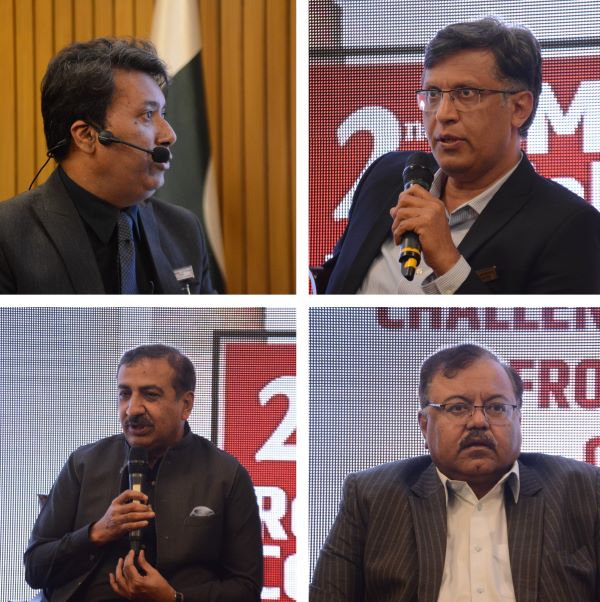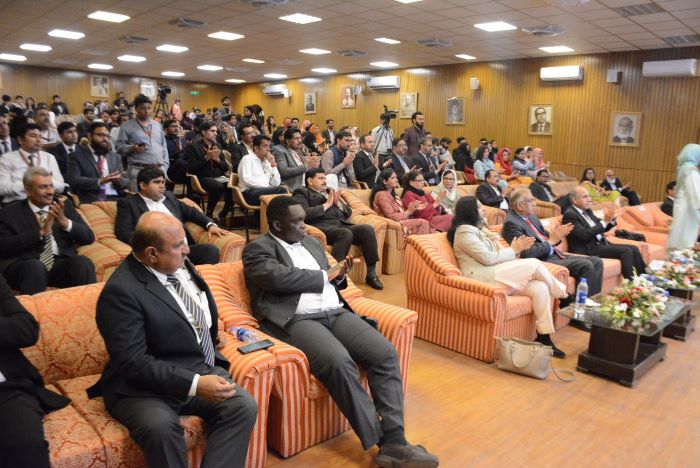Academicians from Pakistan, Russia, USA and UK show concern on depleting natural resources, increased consumption and growing population at a seminar organized by Sindh Madressatul Islam University
Karachi, Sindh
The distinguished academicians of Pakistan, Russia, USA and UK have shown their concern on depleting natural resources like natural gas, and water owing to increased consumption and growing population.
Speaking at a session on “Integrating Sustainability into Higher Education: Challenges and Opportunities from the Perspective of Academicians” at Sindh Madressatul Islam University (SMIU) Karachi on March 7, they said the sustainability is much needed at all levels for development.
They suggested that each and every one should contribute to sustainability in the field individually and collectively. “Sustainability must be made a part of curriculum of higher education also,” they exhorted.
Dr. Keith Casey Barton, Professor at Indiana University, USA said that the sustainability is a long and slow process, but we should focus on the sustainability for our secure future.
Ms. Shajara Ul Durar, Associate Professor at the University Of Sunderland, UK said that we need to empower students by giving them projects, as the education leadership has to take responsibility of all things.
She suggested that educational institutions should take responsibility to publish social impact reports and that should be made a part of the academia.
Dr. Solnyshkina Marina Ivanovna, Professor of Linguistics at the Kazan University of Russia narrated her success story and social and educational conditions during and post-Soviet Union period.

She informed that that in the educational institutions of Russian Federation mixed courses are being taught to students. She further said without any gender difference we have to contribute to our society and its sustainability. She said her country Russia is rich in natural resources and has brought sustainability in its all areas.
Former Vice Chancellor and present Pro-Vice chancellor of Mehran University of Engineering and Technology, Jamshoro Dr. Muhammad Aslam Uqaili said that the resources we use are no more sustainable. “We are using these resources at the cast of our future generation.”
He said development has the cast to pay. “When we are developing our countries we are not considering how we can provide sustainability to our resources.”
Dr. Uqaili said we have much used our energy resources as a result even in Karachi, citizens are facing shortage of natural gas. “We are looking to reuse and recycle the waste materials, but Germany has now gone to the zero waste.”
Dr. Uqaili further said we believe that universities are agents of change, and these are producing human resources to the society, therefore, for sustainability we have to provide capacity building trainings to youth for sustainability.
Dr. Manzoor Hussain Soomro, ECO Science Foundation said people need to be educated about sustainability. They need to know what are the factors affecting our environment and what the skills and technologies are required to achieve the sustainability without going into SDGs and targets.
He said education as well as SDGs 4 and 5 emphasized that education should be across the board and for all. Therefore, there is a need to transform the society according to the way we think and the way we are groomed. “To achieve the targets we should go back to early child education, then building the tertiary education and then higher education.”
He suggested that in this respect we have to engage the HEC to bring school children, university students, faculty, industry, media and all the stake holders at one platform to play their major role.
Dr. Soomro said we are working in isolation, but everyone must be resilient at these issues and in this respect science education is most important.

Dr. Fateh Mohammad Marri, Vice Chancellor of the Sindh Agriculture University, Tandojam talked on the food sustainability and said we know that our natural resources, land, water and forest reserves are limited. On the contrary population is growing, and therefore demand for food has increased. He said because of change in consumption pattern and urbanization there is a huge pressure on natural resources. “Now we have to meet the requirements of the current population and current need of the country without compromising on our future need and without compromising on the interests of future generations.”
Dr. Marri said integration of the sustainability in higher education is also important. He suggested that now the task is to improve production and productivity. “Higher education also needs sustainability.”
“Around 03 percent of our illegible cohort gets in higher education and 90 percent is still out of higher education,” Dr. Marri said and added that we have to make education sustainable for all children.
Dr. Jawad Syed, Professor at the Lahore University of Management Sciences (LUMS) said that it is important at the university level that we should revisit our priorities, because for these all things students are not responsible, they are our product, hence we have to look at our key performance indicators that how many courses are carrying sustainability.
Dean Faculty of Management, Business Administration and Commerce of SMIU Dr. Jamshed Adil Halepoto moderated the session.
The session was attended by Chairman Sindh HEC Dr. Tariq Rafi, Vice Chancellor of SMIU Dr. Mujeeb Sahrai, national and international scholars, SMIU’s faculty, heads of different academic and administrative departments and students. In the end of the session Dr. Mujeeb Sahrai gave away souvenirs to the guests.
_______________
Published under International Cooperation with "Sindh Courier"
Comments